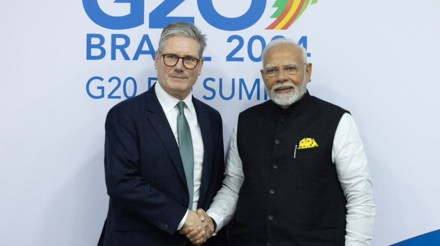The UK-India Free Trade Agreement (FTA), a key trade deal that could significantly reshape bilateral economic relations, is set to relaunch in early 2025. This announcement comes after a high-level meeting between UK Prime Minister Keir Starmer and Indian Prime Minister Narendra Modi on the sidelines of the G20 summit, signalling renewed commitment from both nations to enhance their economic and strategic partnership.
The relaunch of the UK-India FTA negotiations represents an important move in strengthening the UK’s global trading position. The deal holds the promise of not only boosting trade but also fostering closer ties in areas such as security, technology, education, and climate change.
Strategic Significance of the UK-India FTA
Prime Minister Keir Starmer underlined the importance of the UK’s international trade relationships, noting that they are essential for driving domestic economic growth. “Boosting economic growth is key to improving living standards for working people. A new trade deal with India will support jobs and prosperity in the UK,” Starmer said, underscoring the positive impact an FTA could have on both countries. As the fifth-largest economy in the world, India is a vital partner for the UK, and the proposed deal aims to create jobs, enhance investment, and improve market access for both nations.
The FTA negotiations, which initially began in January 2022, were temporarily stalled due to elections in both countries. However, with both Prime Ministers now firmly committed to reaching a final agreement, there is optimism that the deal will be completed early next year.
Current State of Trade and Economic Cooperation
As of 2023-24, trade between the UK and India reached a substantial USD 21.34 billion, showing significant growth from the previous year. UK exports to India alone accounted for USD 16.6 billion. This robust trade relationship forms the foundation for the FTA discussions, with both governments eager to build on these figures.
The new FTA is expected to enhance market access across a variety of sectors. British firms are particularly keen on reducing Indian tariffs on key exports such as scotch whiskey, electric vehicles, lamb, and confectionery, while India seeks greater access to the UK’s service sectors, including telecommunications, legal services, and financial services.
As UK Business and Trade Secretary Jonathan Reynolds noted, “India is a vital trading partner for the UK. We believe there is a good deal to be done here that works for both nations.” By eliminating tariffs and opening up investment opportunities, the FTA could create new jobs and economic growth on both sides.
Key Negotiation Issues
Several key issues must be addressed before the FTA can be finalized. These include:
Market Access for Goods and Services:
India has long advocated for greater access for skilled professionals in sectors such as IT and healthcare. Additionally, it seeks zero-duty access for a range of goods, including textiles and pharmaceuticals. The UK, on the other hand, is focused on reducing Indian tariffs on its exports, including luxury goods like scotch whiskey, as well as agricultural products such as lamb and chocolates.
Investment and Intellectual Property:
Another critical aspect of the FTA involves the negotiation of a Bilateral Investment Treaty (BIT), which would cover areas such as goods, services, investments, and intellectual property rights. Both nations are keen on fostering deeper investment ties, with UK businesses already supporting over 600,000 jobs in India.
Labour, Environment, and Sustainability:
One of the more contentious issues in the talks has been India’s resistance to including labour and environmental standards in the agreement. The UK has pushed for commitments in these areas, but India is cautious about incorporating policies that could require significant domestic changes. This could impact sectors such as textiles, which are crucial to both economies, especially given the UK’s focus on sustainability and fair labour practices.
Visas and Immigration:
Another potential hurdle is the negotiation around visa provisions for Indian professionals. While India seeks greater opportunities for its citizens to work in the UK, the British government is keen to ensure that visa schemes are manageable and do not lead to excessive migration. Both sides will need to strike a balance that satisfies their respective domestic priorities.
Potential for Growth and Cooperation
The FTA presents a vast array of opportunities for both India and the UK. For India, access to the UK’s advanced technology and service sectors could be transformative, especially in areas such as fintech, legal services, and education. Meanwhile, the UK stands to benefit from expanded access to India’s growing consumer market and its burgeoning sectors, such as renewable energy and digital technology.
As Indian Prime Minister Narendra Modi highlighted, “We remain committed to deepening comprehensive strategic partnership and robust India-UK economic ties for the progress and prosperity of our people and global good.” This commitment to cooperation highlights the shared vision of both leaders, who see the FTA as a vehicle for broader collaboration across a range of sectors.
Challenges and Outlook
Despite the optimism, challenges remain in the negotiations. India’s reluctance to accept labour and environmental standards, along with concerns over the sustainability of certain sectors, could prove difficult to resolve. Similarly, the visa issue, which is contentious on both sides, could complicate the talks. However, with both countries showing a willingness to engage in constructive dialogue, there is hope that a mutually beneficial deal will be struck.
The relaunch of the UK-India FTA in early 2025 is a significant moment in the evolving relationship between these two nations. As both sides work toward the finalization of the deal, the UK and India stand to benefit from a closer, more robust economic partnership—one that could shape the future of trade between the two countries for years to come.
